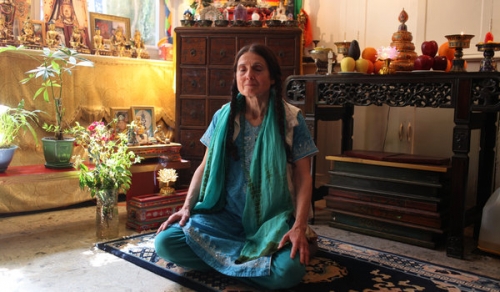
Mainstream media has done it again. I’m sure you’ve heard already, but neuroscience and meditation are the new “It” couple. This week the NY Times joins the fray in an article that is essentially a roundup of the different benefits that meditation can have on the brain. In addition to citing a few studies at various universities around the country, they trot out 63-year-old Buddhist practitioner Katherine Splain, who claims that her long meditation practice helped her finish an 80-page master’s thesis—when she was 60.
As I’ve written about in previous Buddha Buzzes, I’m dubious about the influx of neurological studies in regards to meditation. That notwithstanding, I have one major bone to pick with the NY Times on this one: Where’s the religion? The protagonist of the story, Splain, is clearly religious. Just look at the photo to the upper right! And yet the article neglects to mention that she’s a devout Buddhist until the second to last paragraph of the article. To me this neglect highlights exactly the problem with science examining meditation: there’s just no way to take the religious or spiritual element of it into account.
Then again, it’s not like religion is always a wonderful modifier of human behavior. In yet another case of Buddhists behaving badly, eight monks belonging to South Korea’s Jogye Order, the largest Buddhist sect in South Korea, were caught on film smoking, drinking, and playing high-stakes poker. And by high stakes, I mean high stakes—the merry monks were gambling with the equivalent of almost $900,000, apaprently taken from donations. The icing on the cake? The gambling party occurred after the monks had come together at a “luxury lakeside hotel” for another monk’s memorial service. Here are the monks caught on tape:
ln response, six high-ranking members of the Jogye Order resigned. The president of the order, Venerable Jaseung, will bow 108 times in repentance every morning for 100 days. The Korea Herald has reported that the monk who sent the film to the South Korean prosecution office found it on a flashdrive that was lying in front of a Buddha statue in an unknown temple. The Herald continued, “Insiders claimed that opponents of the Most Ven. Jaseung, the rival group that lost the election for the top post in the Buddhist sect, secretly recorded the incident and released the video with the aim to topple the current leadership.”
And that’s what you call Buddhist politics, folks.
Thank you for subscribing to Tricycle! As a nonprofit, we depend on readers like you to keep Buddhist teachings and practices widely available.